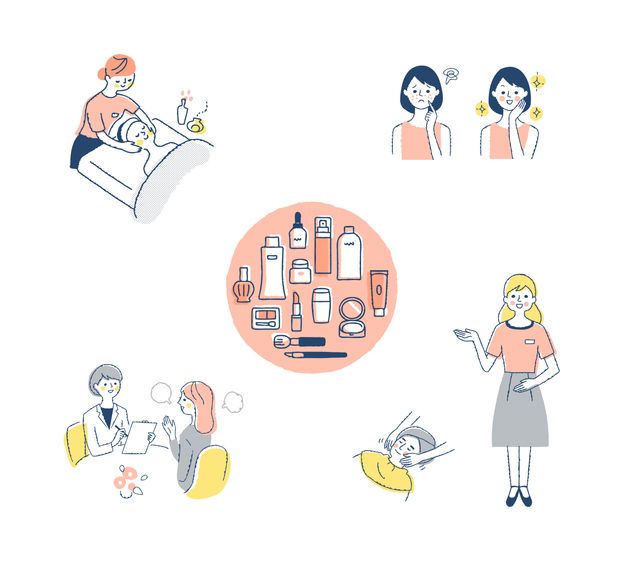
Book Now to Experience
Acne Treatment
1 Minute Self-Registration
Date should not be before minimal date
Author: Puteri Fikri|Updated: 23 July 2024
Acne in general can be very troublesome to many people who face them. Although it is actually quite common for your skin to have pimples due to clogged pores. Teenagers and young adults are the most often targeted to have them but there are also cases for adults. Acne can be understood as a skin disease where the hair follicles are blocked with dead skin cells, bacteria or excess oil. Sebaceous glands are tiny glands found near the surface of the skin. The glands are attached to your hair follicles and this is where you can see the thin individual hair grows out of. These sebaceous glands lubricate the hair and the skin to stop it from becoming too dry. The lubrication is called sebum which will eventually lead to your acne formation. For acne to occur, the glands will noticeably secretes excess sebum and when mixed with dead skin cells, clogged the follicle. If the clogged hair follicles are close to the skin, they will bulge outwards. This can be seen on your skin as whitehead and if the clogged follicle is open on the skin, they will be creating blackheads. Your skin will be shedding dead cells on a daily basis and bacteria which live on your skin will contaminate your follicle causing them to be filled with papules, pustules, nodules or cysts.

1
What is the cause for your acne breakout?
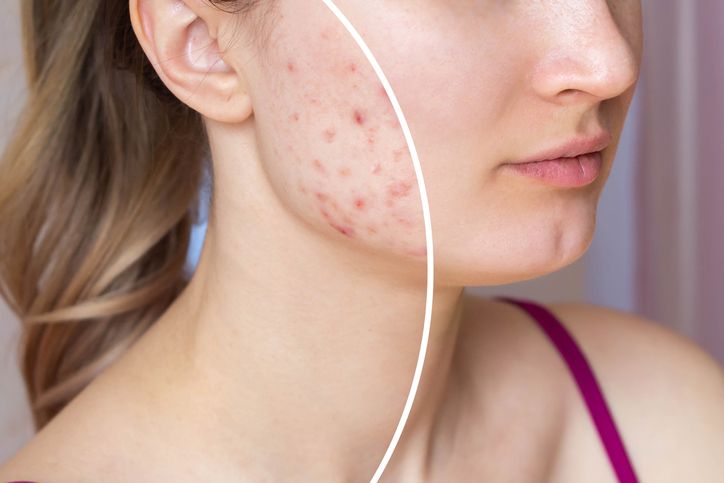
Testosterone
Increased testosterone levels, which happen during puberty, are thought to be the cause of teenage acne. The hormone is crucial in preserving girls' muscle and bone strength as well as encouraging the growth and development of the penis and testicles in boys.
In particular, the sebaceous glands are responsive to hormones. It is believed that higher testosterone levels lead the glands to create far more sebum than what the skin requires.
Hereditary
According to study, having acne in both of your parents increases your risk of developing more severe acne at a young age. Additionally, it was discovered that you are more likely to develop adult acne if one or both of your parents have them.
Acne for women
Pregnancy - many women experience acne symptoms at this time, typically during the first three months of their pregnancy. Menstrual cycle - some women experience an acne flare-up immediately before their period.
Acne, weight gain, and the development of tiny cysts inside the ovaries are all possible symptoms of the prevalent disorder polycystic ovarian syndrome.
Other causes that lead to acne
Cosmetics or skincare, though this is less prevalent given that most products have been tested to ensure they don't produce spots (non-comedogenic)
Certain pharmaceuticals, including steroid medications, lithium (used to treat depression and bipolar disorder), and some epilepsy medications, as well as high-GI diets, can cause acne in older adults.

2
What is the type of acne you are having?
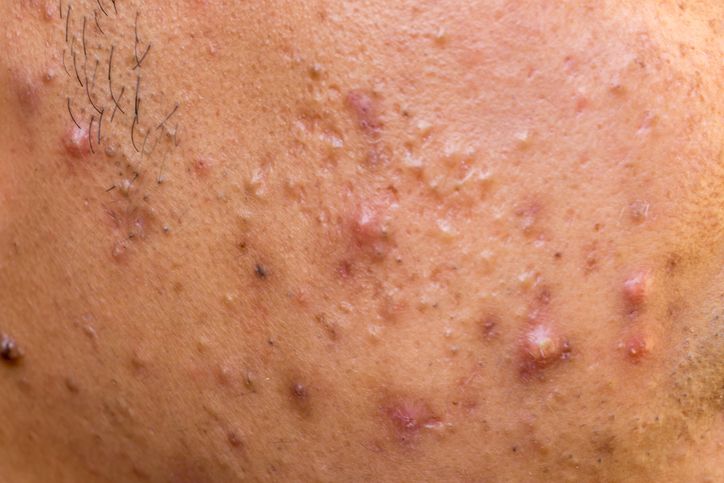
Cystic acne
Normally this acne causes painful, pus filled pimples from under your skin. Like the other type of acne, it is formed when excess oil and dead cells clog your pores with the addition of bacteria presence to cause swelling or skin redness. This is considered a severe acne type and to know what is actually causing them can be quite subjective. As it can be caused by age, family history or hormonal changes.
Cystic acne can resemble a type of skin irritation which looks like a red lump on the skin, painful and oozing pus from a white to yellow head. Cystic acne may cover a large area of the skin, mainly on the face. It may also appear on the butt, neck or chest area. This acne will also cause skin itchiness the most compared to the other types of acne.
Hormonal acne
This type of acne occurs due to the overproduction of sebum that clogged your pores. Hormonal acne is often unavoidable but they can be treated to avoid future breakouts from reoccurring. This acne normally affects both men and women and during the age range of 20 to 50 which is why it is called adult acne.
To simplify, the causes for this acne are stress, lack of sleep or products that are comedogenic which clogged the pores. However, the other causes that will lead to hormonal acne that you can not avoid are changes of hormone level like during your period, family history or side effects of medication. You can identify this type of acne when your skin is having whiteheads, and blackheads, as well as papules, pustules or cysts.
Read More

3
Severe acne type
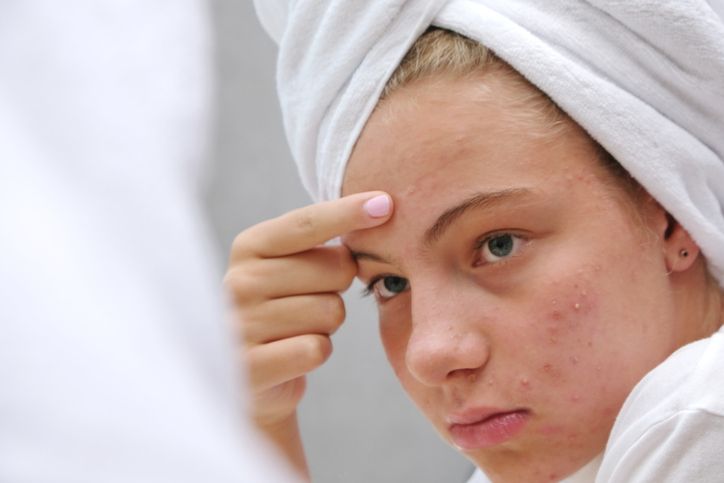
Fungal acne
Unlike cystic, this type of acne is actually caused from yeast buildup in your hair follicles and can be itchy and inflamed. The yeast in general is a part of your skin, however with certain conditions, there can be overgrowth and cause acne buildup. Among the conditions that will promote the overgrowth of this yeast are trapped moisture, medication, suppressed or immune system. This skin condition actually is a type of infection in the follicles.
Fungal acne can be observed as small pimples that are itchy. It can be mistaken with acne vulgaris as they both can appear like whiteheads. Thus it is important to identify which type of acne you are having because they will respond with different treatments. If you are using anti acne treatments, it will only make your fungal acne worse. Check out for the symptoms that you are having or go to a certified dermatologist to treat severe acne.
Nodular acne
This is a severe acne type which causes pimples on the surface of the skin and tender, nodular lumps under the skin. This type of acne may result in acne scarring because they can last for weeks or even months. The cause for this acne varies but if you don't properly clean your skin or if your body produces too much sebum, blocked pores may develop.
They may also be caused by sweating excessively increases your risk of developing nodular acne, especially if you're wearing clothing that presses perspiration against your skin. Nodular acne may be more likely to occur in those who have hyperhidrosis, a disorder that causes excessive sweating.
Hormones: As hormone levels fluctuate in adolescents going through puberty, acne outbreaks are more prone to occur. Your skin's oil can thicken due to elevated levels of the hormone androgen, clogging pores. The hormone is more prevalent in teenagers and young adults who were assigned male at birth.

4
Acne myths you should know
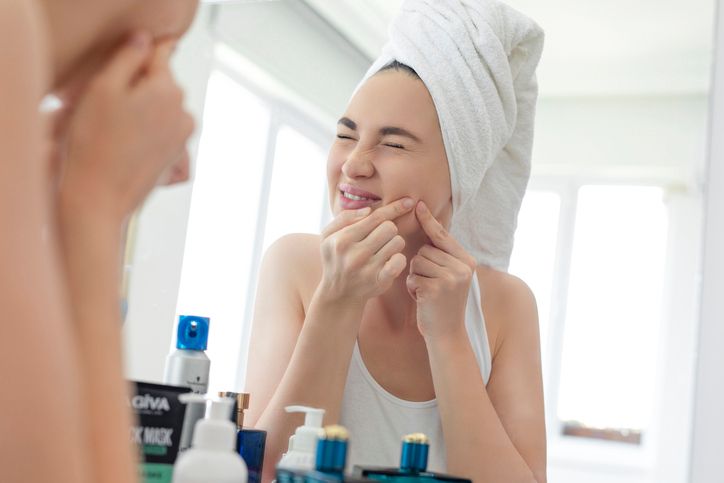
Having filthy skin and inadequate hygiene induce acne
The cleanliness of your skin has no bearing on your acne because the majority of the biochemical responses that cause acne take place below the skin, not on the surface. Washing your face more than twice a day could make your skin more sensitive.
The greatest method for treating acne is to squeeze out blackheads, whiteheads, and spots.
In fact, this can exacerbate your symptoms and leave you with scarring.
"Sunbathing, using sunbeds, and using sunlamps all help reduce acne symptoms."
There isn't any solid proof that utilizing sunlamps, sunbeds, or continuous exposure to sunshine may treat acne.
Toothpaste as spot treatment for your acne
Although toothpaste does have antimicrobial ingredients, it also has ingredients that can irritate and harm your skin.

Book Now to Experience
Acne Treatment
1 Minute Self-Registration
Date should not be before minimal date

5
Professional acne treatment
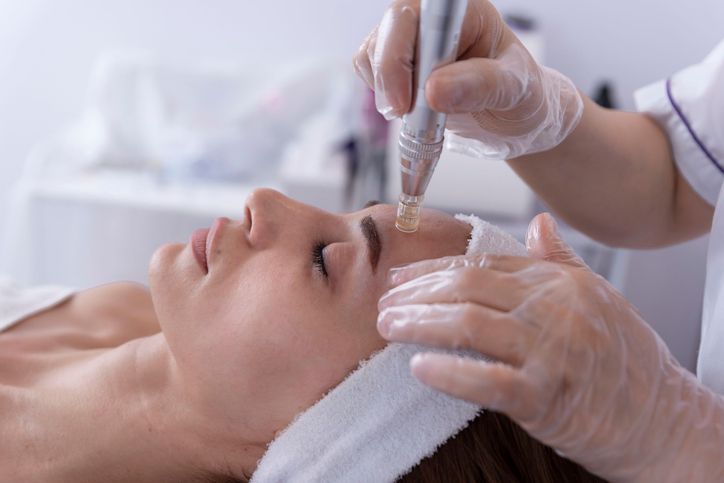
There are numerous treatments for acne, it is just that you need to find which suits best for your skin and acne type. In general, it is always recommended to seek professional help to diagnose your acne's condition. While over the counter and proper skincare routine can do the job, treating skin conditions sometimes calls for professional opinions.
Light therapy
In contrast to other light therapy, for intense pulsed light (IPL) procedures, it targets the red colouring of active acne while also using small bands of light to destroy germs. This lessens scarring by treating active lesions and preventing the outbreak of new pimples. For the best (long-lasting) outcomes, three to five sessions are necessary, while some maintenance may be necessary.
Microdermabrasion
Microdermabrasion can be useful to promote skin turnover, decongest pores, and treat tiny comedones, all of which helps to speed up the healing of acne while preventing further outbreaks.
Extractions
Although you might be tempted to pop zits yourself, extractions are best left to the experts. A thorough acne treatment regimen should include medical-grade sterile acne extractions which are usually done by professionals that can help remove dead skin cells at the same time.
Microneedling
Microneedling, which is well known for enhancing skin tone and texture, has shown potential as an acne scar treatment. Small wounds from the tiny needles encourage the growth of collagen in the region. This is advantageous since acne scarring frequently results from a localized collagen loss. While microneedling functions well on its own, it functions much better when combined with other modalities.
A pulse of energy is applied as the needles enter the dermis to help the remodeling process even further. Meanwhile, platelet-rich plasma, or PRP, can also improve outcomes. Recent studies have showed that using PRP instead of only microneedling alone significantly improved acne-scarred skin. There is relatively little downtime and minimal discomfort with these procedures.
Chemical peels
Chemical peels can promote skin turnover, enhance healing and reduce the pigmentation on your skin. All of the conditions that are caused by acne like skin discoloration and skin texture can be improved by consistent usage of chemical solution. The idea to this acne treatment is to remove the top layer of your skin. While the outermost layer may contain dead skin, it really helps to get a smoother skin after this process.

6
Chemicals that can help to treat acne
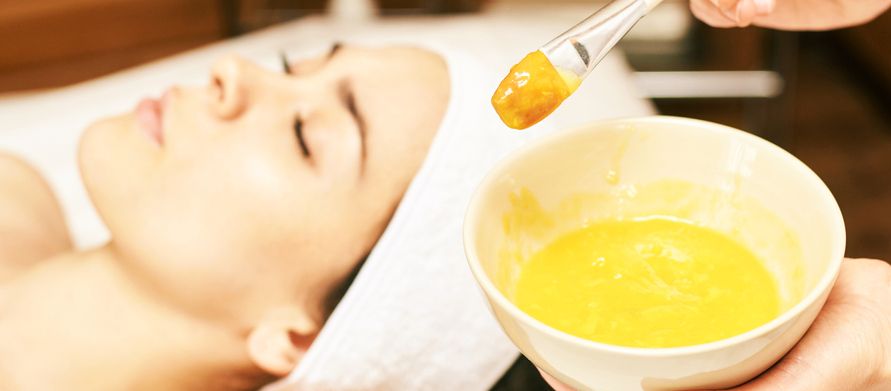
Salicylic acid
Salicylic acid is one of the ways to treat acne that has been used ever since we are in our teens. The acid has been the active ingredient in most anti acne skincare. Salicylic acid works by reducing the swelling and unclogging pores to help the bump to minimize in size. As this acid also contains anti inflammatory effect properties, it will help to soothe inflamed acne.
Glycolic acid
Also known as alpha hydroxy acid (AHA), this ingredient works by gently exfoliating the skin to get rid of dead skin that clogged the pores. However, this acid can worsen acne which you need to understand before actually applying it.
Benzoyl peroxide
Benzoyl peroxide is very effective to kill bacteria which causes acne but they tend to cause the skin to be dry. Thus, most dermatologists would suggest you to use a formulation with concentration that is not more than 2%. Benzoyl peroxide can also help to shed the excess dead skin and make the scars less prominent. Benzoyl peroxide is usually found in face washes and acne creams.
Azelaic acid
Azelaic acid can be applied to your skin in the form of gel, foam or cream which have both antimicrobial and anti-inflammatory properties. It can take some to take effect for treating acne as compared to other types of acid.
Topical retinoids
Retinoids are available through a prescription as it can be quite harsh to sensitive skin. Retinoids do not only work wonders for anti aging but are also efficient to clear up acne. While retinoids have anti inflammatory, it is not safe for pregnant or breastfeeding women.
Acne medication
There are myriad types of acne medication that you can obtain through prescription or over the counter. For instance, a combined oral contraceptive pill can actually improve your hormones and indirectly clear up your acne pimples. This can be considered as hormonal treatment to help get your acne treated. These oral antibiotics can be quite harsh and will affect your body so it is best to get them from your dermatologists.
What can you do to avoid acne?
To actually control acne, you can start with leading a healthy lifestyle with a balanced diet and keep yourself out of stress as these can be the reasons for your breakouts too.
Firstly, use a mild soap as acne wash, especially if you have dry skin redness. Always use a moisturizer that prevents dryness and skin peeling because many acne products contain components that dry out the skin. Moisturizers are available for all skin type with different ingredients that work best for them. It is important for you to find moisturizer that will not clog your pores and is not too thick or heavy for your skin.
Wear sun cream although you will not stand in the sun for too long. You never know when and how the sun's rays will affect your skin especially for acne scars.
Basically if you want to start your acne treatment journey, you need to plan and stay focused throughout the process. This is because not every treatment that you try will actually improve acne. They can even result in moderate to severe acne so it is important to do a patch test before any treatment. However, when you adapt to a routine that is suitable for your skin, you can have your acne symptoms improve. To completely prevent acne will require a longer time but is not impossible.
FAQ
Should I wash my face more frequently to clear up acne?
While washing your face is a vital element of acne treatment, washing it too frequently might aggravate acne. It is recommended that you wash your face with a light cleanser twice a day.
Can I pop my pimples to remove them?
Popping pimples can lead to further irritation and scarring, therefore it's typically not advised. Alternatively, try topical therapies or seek professional therapy from a dermatologist.
If I have acne, should I avoid applying makeup?
Although makeup can sometimes irritate acne, it is not necessary to avoid it entirely. Opt for non-comedogenic products and cleanse your face completely before going to bed.
Is it safe to take many acne remedies at once?
Employing various acne treatments at the same time might irritate the skin and aggravate acne. Concentrate on one or two treatments at a time and give them time to work before attempting something new.
Is it possible for stress to produce acne?
Stress can aggravate pre-existing acne, but it is not a primary cause. It is critical to manage stress through methods such as exercise, meditation, or treatment.

Book Now to Experience
Acne Treatment
1 Minute Self-Registration
Date should not be before minimal date
Recommended Articles
COPYRIGHT© NEW BEAUTY MANAGEMENT LIMITED 2025. ALL RIGHT RESERVED.


